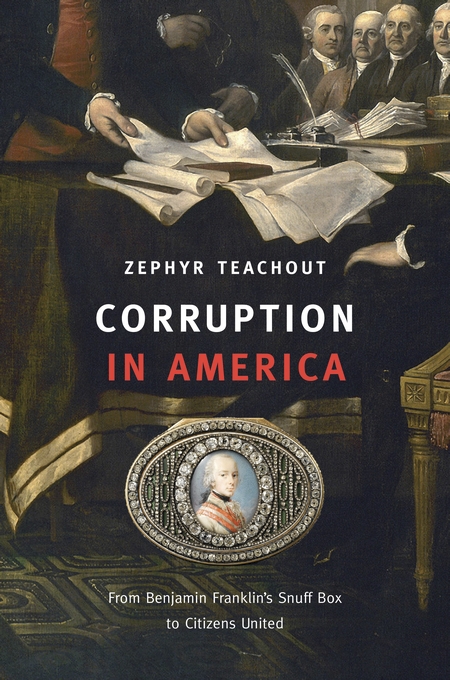
New Book: Corruption in America: From Benjamin Franklin’s Snuff Box to Citizens United. By Zephyr Teachout
 Zephyr Teachout, Corruption in America: From Benjamin Franklin’s Snuff Box to Citizens United, Harvard University Press 2014. ISBN 9780674050402. 384 pages
Zephyr Teachout, Corruption in America: From Benjamin Franklin’s Snuff Box to Citizens United, Harvard University Press 2014. ISBN 9780674050402. 384 pages
When Louis XVI presented Benjamin Franklin with a snuff box encrusted with diamonds and inset with the King’s portrait, the gift troubled Americans: it threatened to “corrupt” Franklin by clouding his judgment or altering his attitude toward the French in subtle psychological ways. This broad understanding of political corruption—rooted in ideals of civic virtue—was a driving force at the Constitutional Convention.
For two centuries the framers’ ideas about corruption flourished in the courts, even in the absence of clear rules governing voters, civil officers, and elected officials. Should a law that was passed by a state legislature be overturned because half of its members were bribed? What kinds of lobbying activity were corrupt, and what kinds were legal? When does an implicit promise count as bribery? In the 1970s the U.S. Supreme Court began to narrow the definition of corruption, and the meaning has since changed dramatically. No case makes that clearer than Citizens United.
In 2010, one of the most consequential Court decisions in American political history gave wealthy corporations the right to spend unlimited money to influence elections. Justice Anthony Kennedy’s majority opinion treated corruption as nothing more than explicit bribery, a narrow conception later echoed by Chief Justice Roberts in deciding McCutcheon v. FEC in 2014. With unlimited spending transforming American politics for the worse, warns Zephyr Teachout, Citizens United and McCutcheon were not just bad law but bad history. If the American experiment in self-government is to have a future, then we must revive the traditional meaning of corruption and embrace an old ideal.
Zephyr Teachout is Associate Professor of Law at Fordham University.
Reviews
“Teachout’s beautifully written and powerful book exposes a simple but profound error at the core of the Supreme Court’s McCutcheon v. FEC decision. The originalists on the Court forgot their history. This is that history—and eventually it will provide the basis for reversing the Court’s critical error.”—Lawrence Lessig, author of Republic, Lost: How Money Corrupts Congress—and a Plan to Stop It
“This is a wonderful and important book. Zephyr Teachout shows what’s wrong with how the Supreme Court thinks about democracy and political corruption, how we got to this terrible place, and that it wasn’t always this way—and doesn’t have to be. There’s a lot of learning and original synthesis here, and also an unmistakable voice, which blends a lively intelligence with passion for democracy as a way of life.”—Jedediah Purdy, author of A Tolerable Anarchy: Rebels, Reactionaries, and the Making of American Freedom